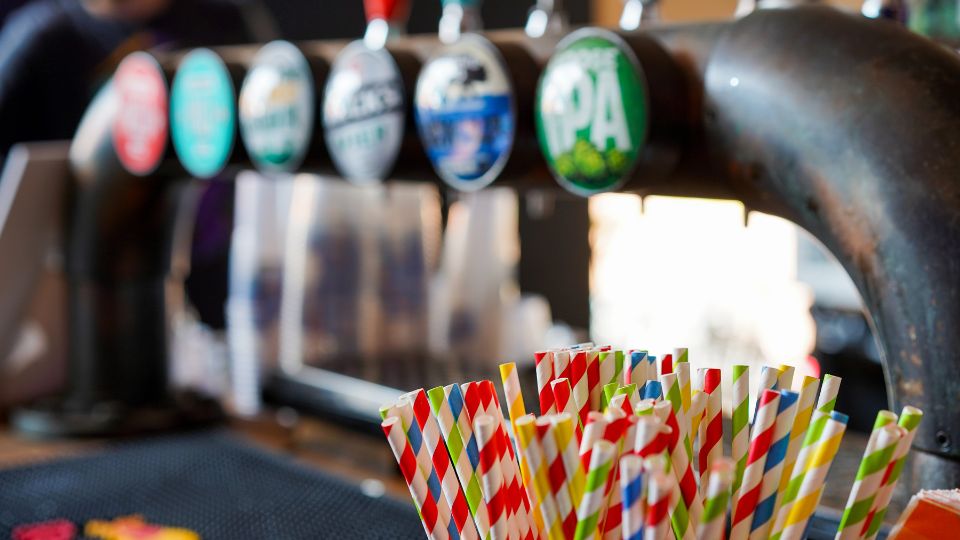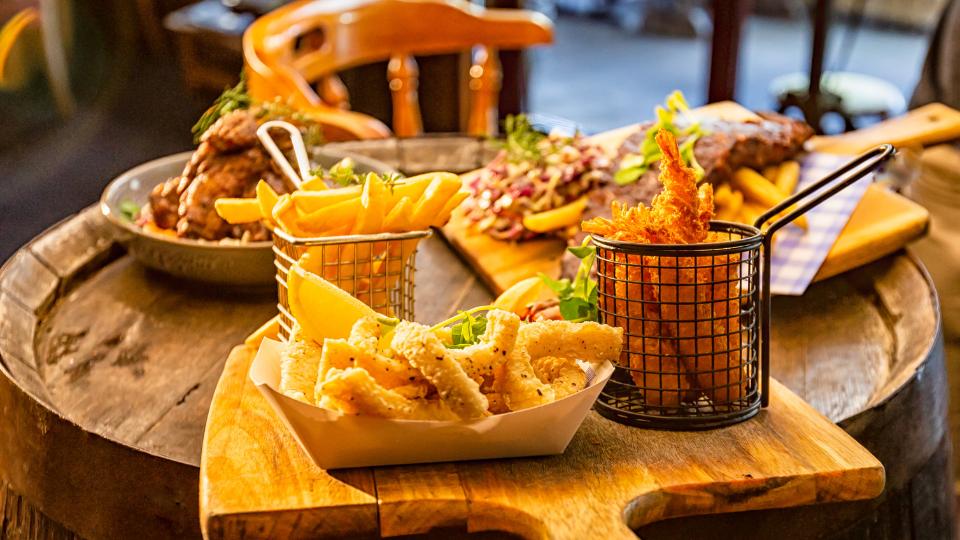
Food waste is a significant issue for pubs, with around 1.3 billion meals thrown away each year in the UK. For pub owners, reducing food waste not only helps the environment but also improves profitability and sustainability.
This guide explores why reducing food waste is essential, identifies sources of waste, suggests strategies for cutting waste, and highlights how technology can help.
Table of Contents:
- Creative Pub Menu with Minimal Food Waste Example:
- Why Do We Need to Reduce Food Waste in Pubs:
- Sources of Food Waste in Pubs:
- Non-Biodegradable Packaging: The Hidden Environmental Cost
- The Environmental Impact of Cooking Oil
- How Tech in Pubs Can Help Reduce Food Waste
- Conclusion:
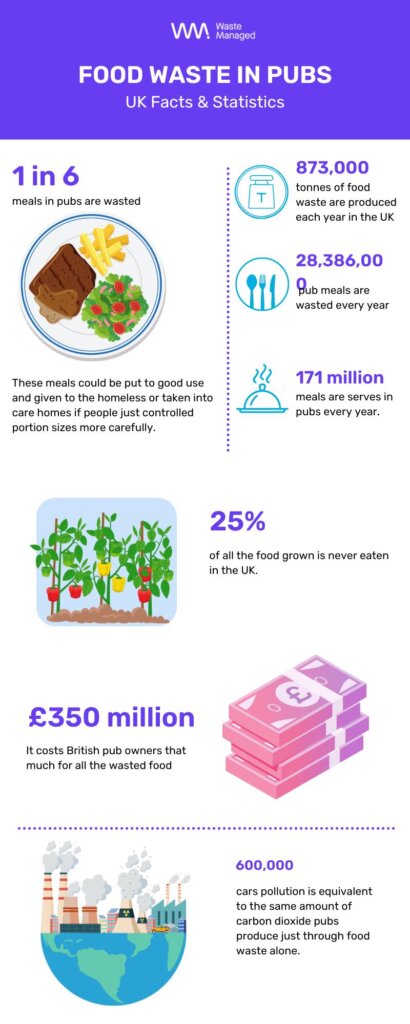
Creative Pub Menu with Minimal Food Waste Example:
Creating a menu that focuses on minimising food waste is both environmentally responsible and economically savvy.
Here are some examples of meals for a pub or restaurant that prioritise low waste by utilising all parts of the ingredients, promoting seasonal and local produce, and incorporating preservation methods:
Sustainable Pub/Restaurant Food Menu
Starters
- Seasonal Vegetable Soup
- Made with fresh, locally sourced vegetables.
- Served with a slice of whole grain bread.
- Stuffed Mushrooms
- Filled with a mixture of local herbs, breadcrumbs, and cheese.
- Baked to perfection.
- Bruschetta
- Topped with tomatoes, basil, and olive oil.
- Served on toasted sourdough.
- Grilled Vegetable Platter
- A selection of seasonal grilled vegetables.
- Served with quinoa and a tangy lemon dressing.
Mains
- Herb-Crusted Salmon
- Sustainably sourced salmon with a herb crust.
- Served with roasted new potatoes and steamed greens.
- Lentil and Veggie Burger
- Homemade lentil patty with lettuce, and tomato.
- Served on a whole grain bun with sweet potato fries.
- Pasta Primavera
- Whole grain pasta with a medley of seasonal vegetables.
- Tossed in a light garlic and olive oil sauce.
- Roasted Root Vegetables
- Seasonal root vegetables roasted with herbs.
- Mixed Green Salad
- Fresh greens with a simple vinaigrette.
- Quinoa Salad
- Quinoa mixed with chopped vegetables and herbs.
Desserts
- Fruit Salad
- A mix of seasonal fruits.
- Lightly drizzled with honey.
- Apple Crumble
- Made with local apples and a whole grain crumble topping.
- Served with a scoop of vanilla yoghurt.
- Dark Chocolate and Berry Parfait
- Layers of dark chocolate mousse and fresh berries.
- Topped with a sprinkle of granola.
Why Do We Need to Reduce Food Waste in Pubs:
Reducing food waste in pubs is crucial for several reasons:
- Environmental Impact: Food waste contributes to greenhouse gas emissions. By reducing waste, pubs can lower their carbon footprint.
- Economic Benefits: Less waste means lower costs for food purchases and waste disposal.
- Social Responsibility: Minimising food waste aligns with broader sustainability goals, which can enhance a pub’s reputation and appeal to eco-conscious customers.
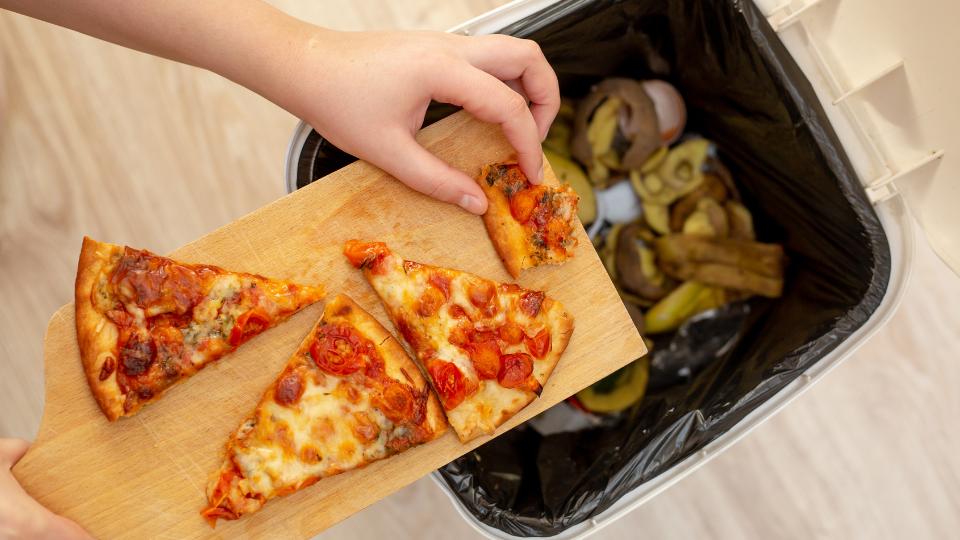
Sources of Food Waste in Pubs:
Understanding the sources of food waste in pubs is the first step toward tackling the issue. Key sources include:
- Overproduction: Preparing too much food leads to unnecessary waste.
- Customer Leftovers: Large portion sizes often result in unfinished meals.
- Human Error: Mistakes in cooking or serving can lead to waste.
- Spoilage: Improper storage and handling cause food to spoil before it can be used.
- Over-ordering: Buying more ingredients than needed leads to excess that may go unused.
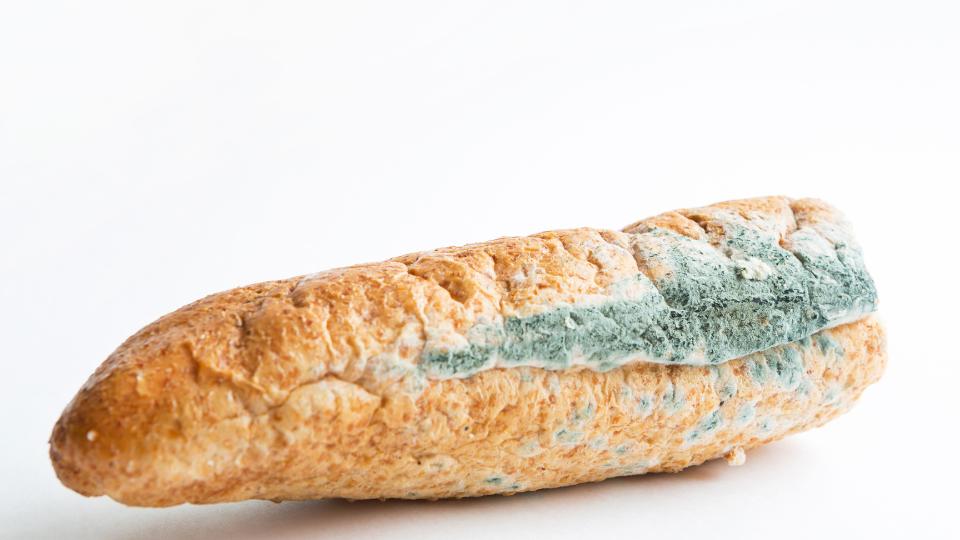
Non-Biodegradable Packaging: The Hidden Environmental Cost
Many pubs rely on non-biodegradable packaging, which contributes significantly to environmental pollution. Here’s how pubs can address this issue:
- Switch to Biodegradable Packaging: Use eco-friendly packaging materials that break down naturally, reducing environmental impact.
- Encourage Reusable Containers: Promote the use of reusable containers for takeaways and leftovers.
- Educate Customers: Inform customers about the benefits of biodegradable packaging and encourage them to make sustainable choices.
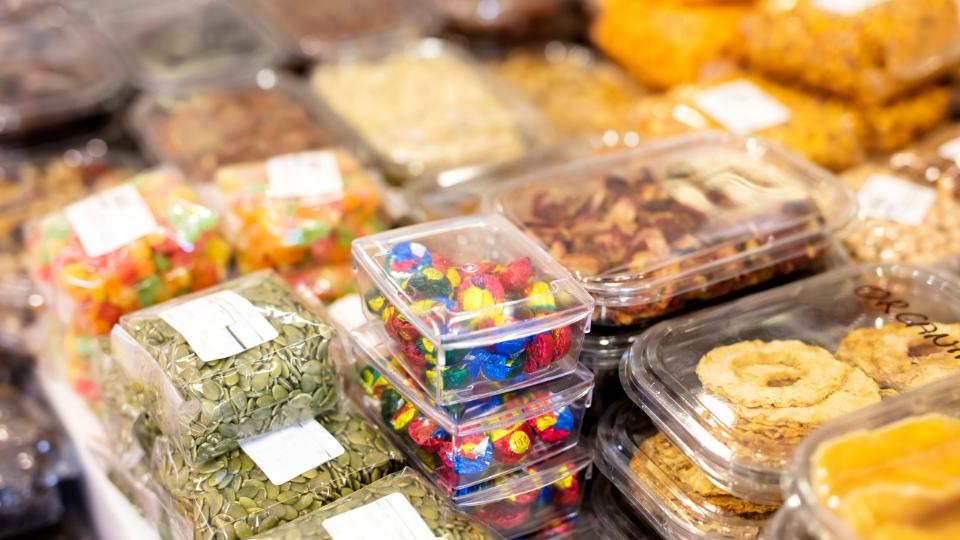
The Environmental Impact of Cooking Oil
Used cooking oil can have detrimental effects on the environment if not disposed of properly. Here’s how pubs can manage cooking oil responsibly:
- Proper Disposal: Ensure used oil is collected and disposed of by certified waste management companies.
- Recycling: Partner with companies that recycle used cooking oil into biofuel or other products.
- Use Eco-Friendly Oils: Choose oils with a lower environmental impact and consider the oil’s lifecycle from production to disposal.
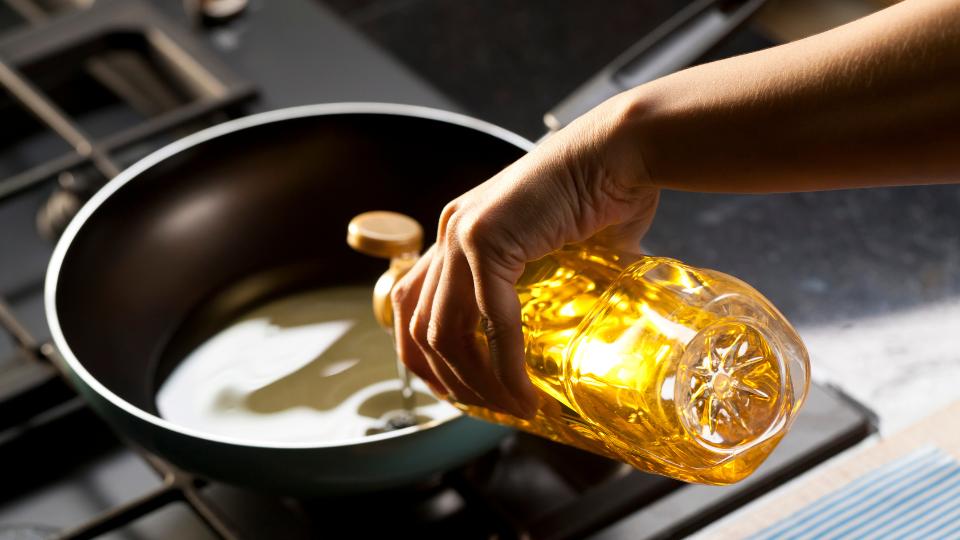
How Tech in Pubs Can Help Reduce Food Waste
Technology offers several solutions to help pubs tackle food waste more effectively:
- Inventory Management Systems: Use software to track inventory levels and expiration dates, reducing the risk of spoilage and over-ordering.
- Waste Tracking Apps: Implement apps that record food waste, providing valuable data to help adjust purchasing and preparation practices.
- Smart Kitchens: Equip kitchens with smart devices that monitor cooking processes and optimise ingredient usage.
- Customer Feedback Tools: Use digital platforms to gather feedback on portion sizes and menu items, allowing for better menu adjustments.

Conclusion:
Tackling food waste in pubs requires a comprehensive approach that includes understanding sources of waste, implementing practical strategies, and leveraging technology.
By adjusting menu portions, repurposing ingredients, training staff, optimising ordering practices, and using bio-degradable packaging, pubs can significantly reduce their food waste.
For UK pub owners, these efforts not only contribute to environmental sustainability but also enhance operational efficiency and customer satisfaction.
Embracing a culture of waste reduction will ultimately lead to a more profitable and sustainable business model.














